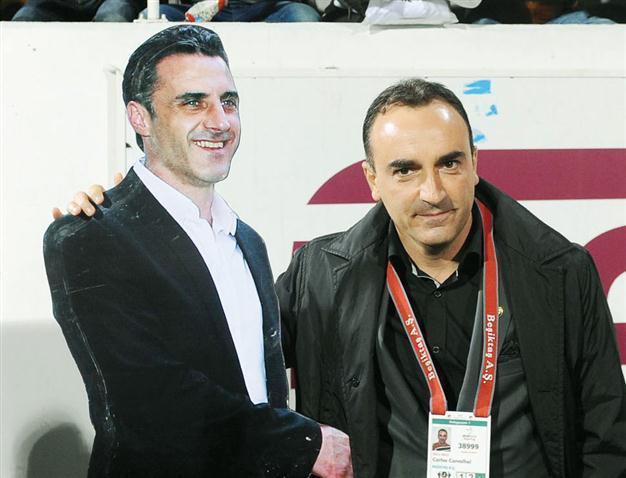8 suspects released in match-fixing case as law set to change
ISTANBUL- Hürriyet Daily News

Beşiktaş’s caretaker coach Carlos Carvalhal of Portugal (R) poses next to a life-sized model of Tayfur Havutçu. AA photo
Beşiktaş coach Tayfur Havutçu and seven other suspects were released from prison pending charges in the match-fixing case yesterday as President Abdullah Gül signaled he would approve a controversial law reducing jail sentences for match fixers.
An Istanbul court ruled in favor of the release of Havutçu along with Beşiktaş officials Serdal Adalı and Ahmet Ateş, Istanbul BB players İbrahim Akın and İskender Alın, Sivasspor goalkeeper Korcan Çelikay, former Diyarbakırspor chairman Abdurrahman Yakut and former Eskişehirspor footballer Ümit Karan upon their lawyers’ appeal in the wake of the looming changes to the match-fixing law.
The amendments suggest a maximum of three years instead of the initial 12 years for officials and players convicted of match fixing.
They have been in Istanbul’s Metris Prison since early July. There are now 23 officials and coaches jailed pending trial. The first hearing for the landmark case is set for Feb. 14.
The court also ruled for the ending of a cautionary ban of the suspects during the continuation of the charges.
Havutçu, Akın, Alın and Çelikay are now cleared to serve their clubs, along with Galatasaray’s Sercan Yıldırım, Fenerbahçe’s Sezer Öztürk, Gençlerbirliği’s Serdar Kulbilge and Mahmut Boz and Bursaspor’s Gökçek Vederson, Eyüpspor’s Murat Şahin, former Karabükspor striker Emmanuel Emenike and coaches Hikmet Karaman and Levent Eriş, who were all listed as suspects in the match-fixing indictment.
Those players and coaches could not serve their team following the release of the indictment Dec. 10.
Havutçu will be able to take over Beşiktaş, who was being coached by caretaker Carlos Carvalhal.
Gül to approve changes
Earlier yesterday, Gül signaled he would approve amendments to the sports violence law, which initially paved the way for the match-fixing investigation, without sending it to the Constitutional Court. “It’s not a constitutional issue. It’s an issue concerning Parliament’s penal policy,” Gül said yesterday during a press conference with his Romanian counterpart Traian Basescu.
Gül used his presidential veto to strike down the same law earlier this month but must now approve the law if it is presented in its same form a second time; even so, he is entitled to refer it to the top court.
When he vetoed the law Dec. 2, Gül said “Parliament designates penal policy” and asked that the legislature review the law.
“But Parliament did not need to [alter the law] and determined its penal policy as such. It’s clear what my next step is according to the Constitution,” he said.
Gül’s veto, a rare move in his presidency, appeared to drive a wedge between himself and Parliament while also dividing deputies of the ruling party.
Parliament again approved the same law Dec. 10.
